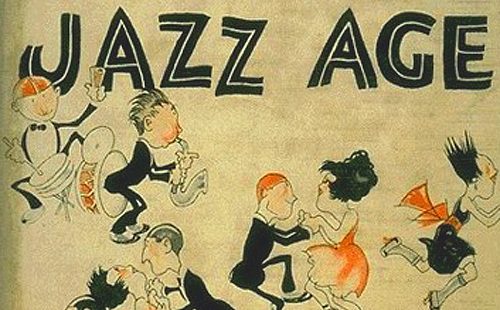F. Scott Fitzgerald is widely viewed as having been the inventor of the term jazz age. Numerous books, academic and otherwise, have proclaimed that Fitzgerald named the decade, coined the term, invented the phrase, and so on and so forth. There is no doubt that the phrase became much more widely used after the publication of Fitzgerald’s 1922 book Tales of the Jazz Age, and one might even argue that without the surge in popularity that came from this, the phrase would never have caught on, but popularizing something and inventing it are not the same thing, and there is considerable evidence that jazz age was in the language before Fitzgerald used it.
On May 23, 1919, an editorial ran in an Indiana newspaper, The Elkhart Truth, with the title “The Age of Jazz.” The article describes some of the complaints that a Baptist minister expressed about jazz: “He finds jazz in present-day magazines, in books, in plays, in art and even in religion. In short, he complains, it is a jazz age.”
A little-remembered book from 1920, titled Side Issues, by an author with the splendid name of Jeffrey E. Jeffrey, contains the line “He met her at a dancing class, and though it was a full cycle before the jazz age, their mutual enthusiasm and proficiency at once attracted them to each other.”
Another editorial, from 1920, found in the Arizona weekly Tombstone Epitaph (which, by the way, is a fine name for a newspaper), railed against the desire of young people to leave farms for the big city: “Back to the farm they will flock, to resume the life which they had despised, completely cured of any desire to answer the call of the jazz age…”
These are not isolated incidents; jazz age was in fairly widespread use between 1919 and 1921. So why do so many people think that Fitzgerald was responsible for introducing it into the English language in 1922? One reason is that people have a tendency to misinterpret the information that they find in dictionaries. The second edition of the Oxford English Dictionary, published in 1989, provided the title of Fitzgerald’s book as the earliest evidence for the use of the word jazz in an attributive or combined form (with other such uses as jazz record, jazz club, and jazz band). The editors of the OED never claimed that this was the first use of the phrase (only that it was the earliest known use in their records), and they certainly made no claim that Fitzgerald invented it. However, many people saw this in the OED and assumed because it was the first evidence of the word that the person who used it there must have invented it.
Fitzgerald has also received credit for coining jazz age because he is a much more famous writer than any of the people who used this turn of phrase in newspapers or magazines, and because his book that uses it in the title is a very well-known one. But, once again, we should not confuse inventing with popularizing, and there is no question that jazz age was invented before Fitzgerald got his hands on it.
—
Ammon Shea is the author of Bad English: A History of Linguistic Aggravation and Reading the OED: One Man, One Year, 21,730 Pages. He lives in New York City with his wife (a former lexicographer), son (a potential future lexicographer), and two non-lexical dogs.












